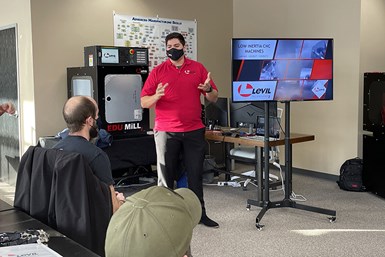Preparing the Next Generation of Machining Talent: Q&A with FANUC America’s Joe Baldiga
What are FANUC and the machining industry doing to address the shortage of skilled manufacturing talent? We sat down with Joe Baldiga, who leads FANUC America’s efforts in Certified CNC Education and Workforce Solutions, to find out.
#columns

Training includes working on the Levil EDU Mill, a 3-axis machining center combined with a 3D printer.
PM: What should our readers know about FANUC?
JB: FANUC is the largest supplier of industrial robotics and machine controls in the world. There isn’t much in our day-to-day world that isn’t touched by a robot or machine and, in most cases, by FANUC equipment. We have more than 4 million CNC controls installed worldwide.
Featured Content
PM: Tell us about FANUC CNC’s approach to Education and some of the tools used in that market?
JB: We offer several tools to support this effort. NCGuide is a software package that gives students more access and time to learn how to program and navigate a control. We add desktop CNC simulators with controls and operator panels identical to those in industry. Our machining simulator provides students with the opportunity to upload programs and run virtual parts without risking damage to a physical machine. From there we move on to the Levil EDU Mill, a 3-axis machining center combined with a 3D printer, and larger lathe and mill products offered through Levil Technology. We also see students learning on RoboDrills with 3- and 5-axis configurations.
PM: How does your recently announced partnership with Doosan build on these options?
JB: Doosan recently introduced its LEO 1600 and DEM 4000 machining centers which are well suited for education given their price points and Doosan’s reputation for building robust and reliable machines. These are offered through our network of education authorized resellers and pair nicely with our other solutions for education to provide a continuum of experiences for students.
PM: Are high schools doing enough to interest students in machining career pathways? What more can be done?
JB: Machining companies need to pay for training, either through upskilling employees or offering continuing education, but they can also support local schools by making financial or equipment contributions to help create a pipeline. We encourage our machining clients to serve on advisory boards and contribute latest and greatest equipment to their local high schools and community colleges.
PM: Why is it important that students learn on a FANUC Control?
JB: FANUC is what is used in industry. The lion’s share of the market is FANUC controls – and not just CNC machines but robotics, lasers, injection mold machines, wire EDMs and more.
PM: How are educators are responding to Industry 4.0 Technology?
JB: One example is Gateway Technical College in Wisconsin, where students learn on robots and machining centers that have been connected by FANUC’s MT-LINKi which tracks pertinent data, including tool wear, coolant levels, temperature, cycle time, errors and disturbances, and offers key learning opportunities in data analysis and predictive analytics.
PM: How are robotics and automation being used to improve manufacturing efficiency?
JB: Automated machine tending offers the opportunity for lights-out manufacturing and optimizes the time of machining talent. We have partnered with APT Manufacturing Solutions to teach robotic machine tending. Advancing even further, APT’s MTEC Computer Integrated Manufacturing system offers learning on a fully integrated smart manufacturing system using technology from FANUC and Rockwell Automation.
PM: If you had one piece of advice for manufacturers who want to partner with educators what would it be?
JB: Partner with your local community college and advocate for your needs and the type of equipment you use. Schools are very receptive to the needs of manufacturers.
PM: Can manufacturers work directly with FANUC’s local educational resellers to support education?
JB: Yes. On the FANUC website one can find the more than 1,400 FANUC CERT schools across North America and a list of Education Authorized Resellers, state by state. There are candidates out there with the right skill sets. We need to match them with the right opportunities.
RELATED CONTENT
-
7 Muda Wastes Every Machine Shop Should Eliminate
Applying lean manufacturing concepts, the Flexible Production method can help put a stop to production wastes, specifically for those who use transfer machines or machining centers.
-
Use Social Media to Attract Young Manufacturing Talent
Nicole Wolter, president of HM Manufacturing and a millennial, suggests tips for creating a social media feed that attracts young people to manufacturing.
-
4 Advantages of Acquiring Another Machining Business
Opportunities to expand CNC machine shop businesses via acquisition come with advantages that manifest themselves in terms of customers, employees, production technologies and business practices.






